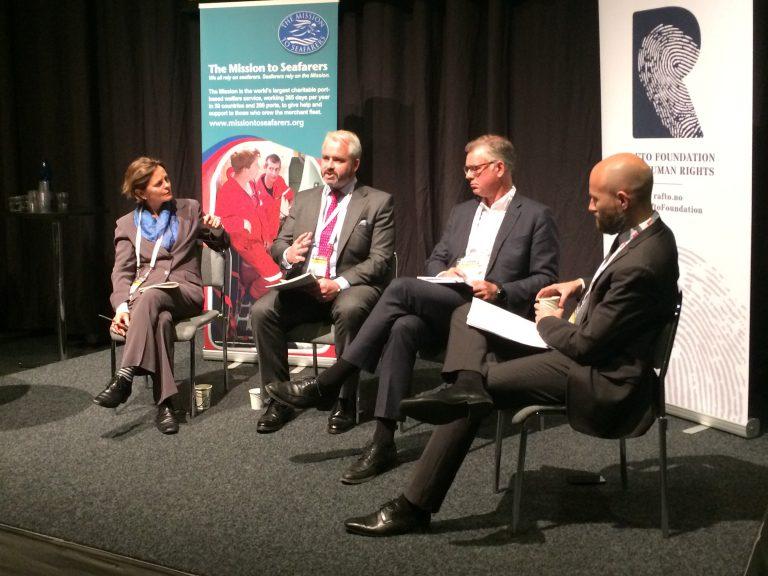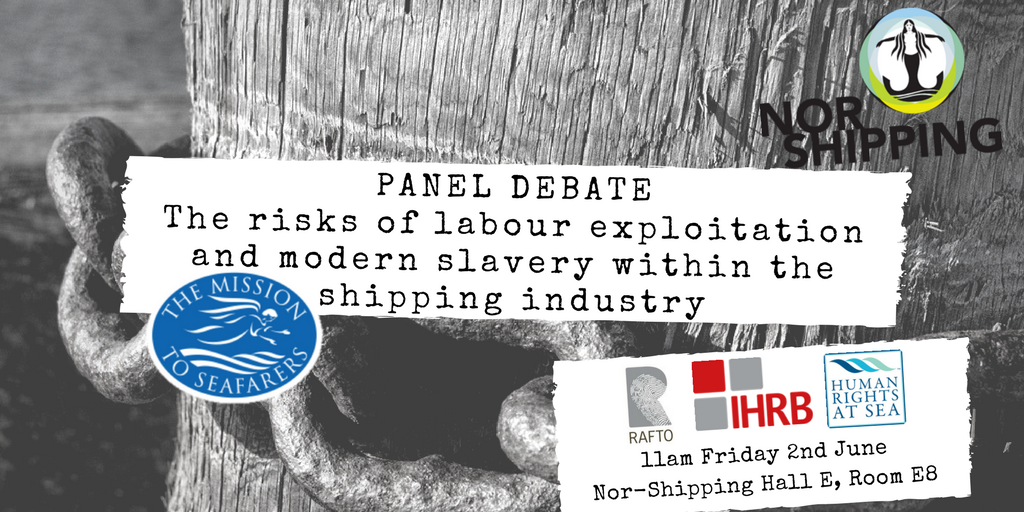The shipping industry must seriously take note of business and human rights
First published: OP-ED Lloyds List 6 June 2017

Hammond: The near absence of attendance at Nor-Shipping by mainstream commercial shipping individuals from any part of the sector spoke volumes.
LAST WEEK, at the heart of the Nor-Shipping conference centre in Oslo attended by in-excess of 10,000 people per day, it was right and proper that the issue of fundamental human rights was put on the official agenda as a panel discussion discussing modern slavery.
Reassuringly, in Norway, the increasing inclusion of human rights considerations in maritime business activities is being driven by a number of leading industry voices.
These forward-thinking individuals come from across the shipowner, investor and banking sectors, with an increasing number of voices now clearly articulating the need for better human rights protections and ethical considerations that go beyond just a corporate social responsibility box-ticking exercise in annual reports.
The resounding message from some quarters was that explicit human rights protections and provisions should be integrated and embedded as part of long-term sustainability plans as a matter of course.
Further, some of Norway’s shipping community appears genuinely open to listening and appear to want to lead change alongside independent NGOs as they have done on the issue of shipbreaking, for example. They do not appear to turn their back with disdain, or shrug dismissively when those apparently ‘toxic’ words of ‘human rights’ are introduced into the debate.
This is an invigorating approach from a country that has a global reputation for fairness, human rights protections and humanitarian standards. It is also an emerging approach that should be carefully noted across the maritime sector, with flag states and governments alike.
The introduction by Ben Bailey of the Mission to Seafarers highlighted the need for the discussion, and the need for the shipping industry to seriously take note of business and human rights. It is noteworthy that the Mission is now advocating more actively and loudly on this subject following up on a discussion championed by Human rights at Sea for the last three years.

The session was introduced and chaired by Jostein Kobbeltvedt, the Director of the RAFTO Foundation, with his introductory questions framed around ‘why the need for business and human rights?’ An experienced panel from the Institute of Human Rights and Business, the OECD Norwegian point of contact and Human Rights at Sea then debated the host of emerging human rights issues, though to a virtually empty room.
The near absence of attendance by mainstream commercial shipping individuals from any part of the sector spoke volumes, even if it was a Friday. Nonetheless, strong attendance by the Kenyan Maritime Authority concerned about the need for better seafarer protections than current international conventions afford was uplifting and insightful, particularly from a government body that wants better.
Lack of attendance in any numbers yet again highlighted the continued uphill struggle that the subject of ‘human rights’ has in order to be mainstreamed as an essential theme within the shipping community; crucially, one to be factored into day-to-day business dealings through the likes of tailored contractual clauses, human rights impact assessments, transparency in terms of public disclosure of human rights policies and openness to objective external challenge.
Let us now look at the positives.
The subject of the need for concerted engagement by maritime business with the plethora of human rights considerations that exist (abandonment, non-payment of wages, violence towards crew, access to justice, access to competent legal representation, unofficial crew blacklisting, right to family life, protection of privacy etc), was finally on an open forum agenda of a major shipping event, and not behind closed doors.
The panel event was a start. It was not perfect, but the fact that a main shipping conference readily provided a platform for open discussion was inspired and for which Nor-Shipping should be congratulated for their foresight.
The bottom line
As a collective global body the shipping industry is woefully lacking in proper engagement with the topic of business and human rights, human rights protections and effective remedies in general. The MLC 2006 is not the golden bullet as unpopular as that perspective is treated in some quarters.
Phil bloomer, chief executive of the Business and Human Rights Resource Centre, highlighted the issue at last September’s International Maritime Human rights conference in London. Human Rights at Sea has also been saying the same. Others are now recognising the business need. This is not a new issue.
In conclusion, it is a matter of fact that the shipping industry is being left behind by other global industries who themselves have rapidly adjusted their business models to included greater transparency, public awareness, internal education and rapid intervention concerning emergent issues of worker abuse in the supply chain.
It is time to become engaged with human rights in business and stop ignoring the issue.

David Hammond is chief executive at charity Human Rights at Sea.
Article from Lloyd’s List: https://www.lloydslist.com/ll/sector/ship-operations/article557321.ece
